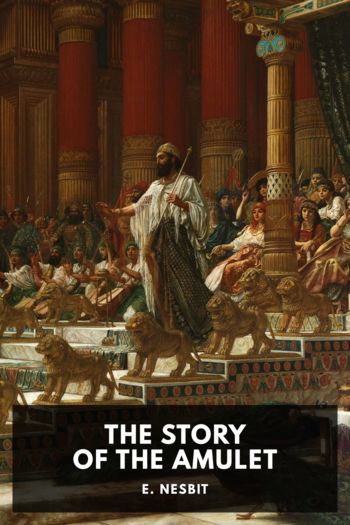The Story of the Amulet, E. Nesbit [free ebook reader for iphone txt] 📗

- Author: E. Nesbit
Book online «The Story of the Amulet, E. Nesbit [free ebook reader for iphone txt] 📗». Author E. Nesbit
The children thrilled to the familiar words.
“So you know that too, do you?” said Cyril.
“It is part of the mystery of all magic, is it not?” said the priest. “Now if I bring you to Pharaoh the little unpleasantness I spoke of will be forgotten. And I will ask Pharaoh, the Great House, Son of the Sun, and Lord of the South and North, to decree that you shall lodge in the Temple. Then you can have a good look round, and teach me your magic. And I will teach you mine.”
This idea seemed good—at least it was better than any other which at that moment occurred to anybody, so they followed the priest through the city.
The streets were very narrow and dirty. The best houses, the priest explained, were built within walls twenty to twenty-five feet high, and such windows as showed in the walls were very high up. The tops of palm-trees showed above the walls. The poor people’s houses were little square huts with a door and two windows, and smoke coming out of a hole in the back.
“The poor Egyptians haven’t improved so very much in their building since the first time we came to Egypt,” whispered Cyril to Anthea.
The huts were roofed with palm branches, and everywhere there were chickens, and goats, and little naked children kicking about in the yellow dust. On one roof was a goat, who had climbed up and was eating the dry palm-leaves with snorts and head-tossings of delight. Over every house door was some sort of figure or shape.
“Amulets,” the priest explained, “to keep off the evil eye.”
“I don’t think much of your ‘nice Egypt,’ ” Robert whispered to Jane; “it’s simply not a patch on Babylon.”
“Ah, you wait till you see the palace,” Jane whispered back.
The palace was indeed much more magnificent than anything they had yet seen that day, though it would have made but a poor show beside that of the Babylonian King. They came to it through a great square pillared doorway of sandstone that stood in a high brick wall. The shut doors were of massive cedar, with bronze hinges, and were studded with bronze nails. At the side was a little door and a wicket gate, and through this the priest led the children. He seemed to know a word that made the sentries make way for him.
Inside was a garden, planted with hundreds of different kinds of trees and flowering shrubs, a lake full of fish, with blue lotus flowers at the margin, and ducks swimming about cheerfully, and looking, as Jane said, quite modern.
“The guard-chamber, the storehouses, the queen’s house,” said the priest, pointing them out.
They passed through open courtyards, paved with flat stones, and the priest whispered to a guard at a great inner gate.
“We are fortunate,” he said to the children, “Pharaoh is even now in the Court of Honour. Now, don’t forget to be overcome with respect and admiration. It won’t do any harm if you fall flat on your faces. And whatever you do, don’t speak until you’re spoken to.”
“There used to be that rule in our country,” said Robert, “when my father was a little boy.”
At the outer end of the great hall a crowd of people were arguing with and even shoving the Guards, who seemed to make it a rule not to let anyone through unless they were bribed to do it. The children heard several promises of the utmost richness, and wondered whether they would ever be kept.
All round the hall were pillars of painted wood. The roof was of cedar, gorgeously inlaid. About halfway up the hall was a wide, shallow step that went right across the hall; then a little farther on another; and then a steep flight of narrower steps, leading right up to the throne on which Pharaoh sat. He sat there very splendid, his red and white double crown on his head, and his sceptre in his hand. The throne had a canopy of wood and wooden pillars painted in bright colours. On a low, broad bench that ran all round the hall sat the friends, relatives, and courtiers of the King, leaning on richly-covered cushions.
The priest led the children up the steps till they all stood before the throne; and then, suddenly, he fell on his face with hands outstretched. The others did the same, Anthea falling very carefully because of the Psammead.
“Raise them,” said the voice of Pharaoh, “that they may speak to me.”
The officers of the King’s household raised them.
“Who are these strangers?” Pharaoh asked, and added very crossly, “And what do you mean, Rekh-marā, by daring to come into my presence while your innocence is not established?”
“Oh, great King,” said the young priest, “you are the very image of Rā, and the likeness of his son Horus in every respect. You know the thoughts of the hearts of the gods and of men, and you have divined that these strangers are the children of the children of the vile and conquered Kings of the Empire where the sun never sets. They know a magic not known to the Egyptians. And they come with gifts in their hands as tribute to Pharaoh, in whose heart is the wisdom of the gods, and on his lips their truth.”
“That is all very well,” said Pharaoh, “but where are the gifts?”
The children, bowing as well as they could in their embarrassment at finding themselves the centre of interest in a circle more grand, more golden and more highly coloured than





Comments (0)